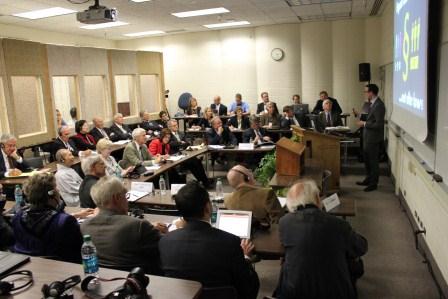Europe: Italy, Germany, and Norway

Robert F. Orton
Regional Research Advisor
José T. Martín de Agar, Italy, has been a Catholic priest since 1976. He is a Doctor of Canon Law (1976) and Law (1984); an Assistant Professor of Canon Law at the Faculty of Canon Law of Navarra; and a Professor of Church-State Relations and State Law on Religion since 1978 in the same university. Since 1984, he has taught such subjects in Rome at the Faculty of Canon Law at the Pontifical University of Santa Croce. His interests include freedom of religion. The Pope has frequently addressed the topic of religious freedom. Freedom of religion should be a civil right and must include tolerance for those who practice minority religions, including the right to join and leave any religion. These rights are universal and inviolable. The liberty of religion is a product of the inability of man to find the truth. The state does not possess the truth of religion—the church must have it. “Know the truth and the truth shall make you free.” Man must find the truth himself through personal conviction. Conscience is based on the existence of the truth. Religious freedom must be recognized as the capacity to seek and find the truth. No one should be forced to act in conflict with his conscience which is based on truth. Society and the state are for the individual, not the reverse. The rights above enumerated are founded on natural law which rests in the heart of man. The Pope insists on the centrality of these rights as existing in the individual. The dignity of these rights must be recognized in society and by the state. The danger in abrogating them in the people—ethnic groups, minorities, etc.—is obvious.
Sven W. Speer, Germany, is the founding chairman of the Forum {for} Open Religious Policy, an advocacy network campaigning for the opening of the state to all religions and secular outlooks. He is a scientific staff member at the German Bundestag focusing on integration and Islam. He was a fellow with the Friedrich Naumann Foundation for Freedom and with the German Marshall Fund of the United States in Washington, D.C. In the past Christian tradition has related primarily to the Catholic and the Protestant Churches. Now, however, there exists a myriad of churches and sects—an open religious policy designed to promote peace and harmony. All of us do things differently, including the food we eat, the beverages we drink, the way we worship and the way we use our free time. Our traditions and mannerisms often offend others. The goal should be to find ways in which we can live in peace and harmony. “People are equal before the law, but not at the law.” Roger Williams, the founder of Rhode Island in the United States, was the first to establish a state in which there existed equality for everyone. The state must guarantee individual freedom, with certain obvious exceptions. France has a policy of pushing religion out of society. Tolerance, however, is not about equality, but about differences. In the United States the state funds secular organizations, but not religious institutions. In Germany, however, the state funds 98.5% of welfare expenditures. We cannot live together in both peace and harmony. It must be one or the other. The public must have free choice in these matters.
Tøre Lindhom, Norway, is Associate Professor at the Norwegian Center for Human Rights, University of Oslo; Faculty of Law, University of Oslo; and board member of the Oslo Coalition on Freedom of Religion or Belief and of the Human Rights Committee of the Church of Norway. His research interests focus on (1) the grounds for embracing universal human rights and in particular the right to freedom of religion or non-religious conviction and (2) the two-way traffic between human rights and religions (particularly with respect to Islam and Muslims). He is a prolific writer and publisher. Norway is perhaps unique in that it kicked-out the Catholic Church many years ago and didn’t join the European Union. When we speak of freedom in an ecclesiastical sense, it should include both religion and belief. Freedom of religion should not be seen as a threat to the Catholic or any other church. We have two problems in Norway: (1) we have a social democratic society which should not go too far from the church; and (2) the church and the religions of the people are the responsibility of the king (the government), and the National Church and the government are totally intertwined. Our constitution in 1814 excluded Jews, Jesuits and Catholics. These exclusions have since, however, been removed. As of next year, there shall be freedom of religion, belief and conscience in Norway, and there shall no longer be an official state church. Moreover, there shall be no restrictions on humanistic and religious rights.